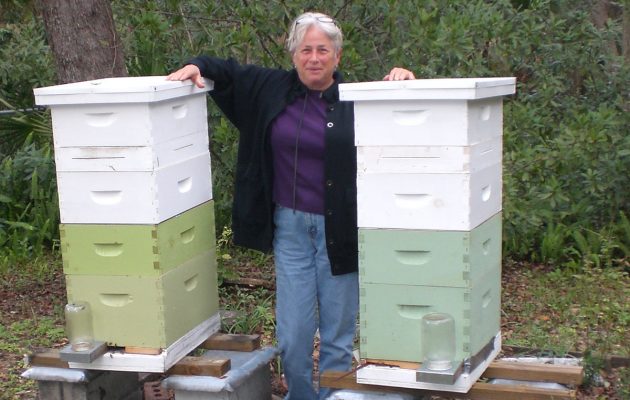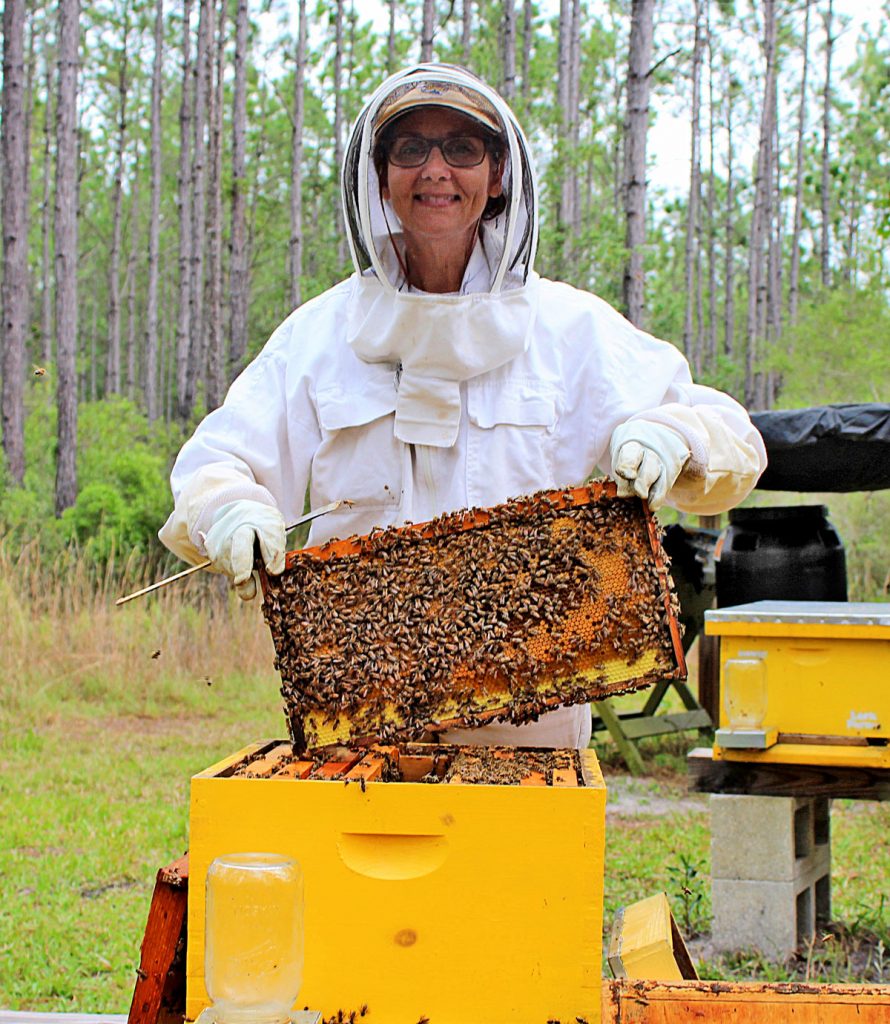Celebrating bees & beekeepers in June

June is the time to celebrate everything to do with bees, specifically June 22-28, the week designated to celebrate the nectar-seeking wonders, promote beekeeping and publicize the critical food-chain importance of fragile pollinators: birds, hummingbirds, butterflies, moths, bats, beetles and small animals.
Apiologists – honeybee experts – want to inform the public about threats to pollinators and protective actions to save them. Super-pollinators, like honeybees cultivated by backyard beekeepers, are environmental workhorses that pollinate flowering plants, trees, fruits, vegetables, and nuts and seeds essential for feeding people and wildlife. One honeybee can pollinate thousands of flowers per day.
The wild and managed honeybee role in the food chain is undisputed, yet the population is decreasing, according to scientific studies. Experts blame pesticide use, pests, diseases, and stress caused by shrinking sources of their only foods: pollen and nectar from flowers. Those hazards are compounded by the bulldozing of wild lands for development, destroying critical habitat. Altogether, these factors may have already set into motion a catastrophic future scenario for pollinators, unless there is change.
One cause for hope is the increasing popularity and regulatory and community acceptance of urban beekeeping. Urban beekeepers manage backyard beehives and nurture pollinators in compliance with state and local guidelines. Even a few colonies help maintain the genetic diversity of healthy bee populations, according to Brent Weisman of the Florida Master Beekeeper Program and the Florida Department of Agriculture and Consumer Services.
Two of approximately 200 local beekeepers are Marilyn Young, whose bees reside in St. Nicholas and Glen St. Mary, and Suzy Faggard, Ortega beekeeper. Young and Faggard became beekeepers through their love for gardening and nature. Both care about environmental issues and support conservation in their own backyards.
Young recently described how the sight and sounds of her honeybees as they contentedly hum around their backyard hives, add endless enjoyment, relaxation, and fulfilment to her daily life. An event held at the Jacksonville Arboretum in 2008 first alerted her to the plight of pollinators.
“That program was so eye-opening it was a turning point in my life. I wanted to get back outdoors every day and enjoy nature again like when I was a child growing up,” she said. “I wanted to plant, garden, learn about agriculture and pollinators. As an adult, with increased responsibilities over time, I felt so far removed from nature. Beekeeping changed that.”

Excited about a hobby that combined conservation with gardening, Young researched the tiny, flying insect-animals with velvety colorful bodies. Of approximately 20,000 bee species, honeybees were first brought to America and managed by European settlers. They measure 15 millimeters long and fly at approximately 15 mph. They perform a “waggle” dance for other bees, that communicates GPS directions to nectar sources up to 3.5 miles from the hive. Honeybees live up to five months, have a heightened sense of smell and dislike loud noise, or glaring lights. Highly sensitive, they display distinctive moods.
Young completed the University of Florida, weekend “Bee College” held at Marineland, (now online). She joined the Jacksonville Beekeepers Association monthly meetings and educational programs at the McDuff Avenue Duval County Extension office. There she met local beekeepers, made friends, and compared notes before the purchase of her first hives and bees.
Both Young and Faggard said anyone with a little free time and enough space can keep bees. One hive is permitted on smaller than a one-quarter acre lot, or up to three hives on a quarter-acre in Florida. They stress the necessity to first review Florida Department of Agriculture regulations, HOA rules or local restrictions regarding beekeeping. Faggard cautioned that beehives should sit far from property boundaries, safely separated from neighbors, children, pets, or farm animals.
Florida Department of Agriculture registration, certification and inspection are required. Costs for two hives average $500-$600, with $10 registration fee. Expenses can be recouped by private sale of nutritional honey or homemade beeswax products, (Florida Cottage Food Law).
Young said she was amazed when her small colony yielded 100 pounds of honey. She said a common misconception is that honeybees require specific flowers, plants or trees. Bees are expert foragers who find what they need wherever available. They feed on flower pollen and nectar as they collect both, for transport back to the hive, where it is used for food, beeswax and honey production. During their travels bees continuously fertilize thousands of plants with pollen caught on their bodies.
Beekeeping also provides mental health benefits recognized by beekeepers and valued by therapists. Whether it is the common challenges of life experienced by everyone, or more serious, unexpected trauma, there is relief, release and a peaceful escape in time spent with bees.
The concentration and focus required to manage beehives, harvest honey or process beeswax showed therapeutic benefits for military veterans with PTSD, Traumatic Brain Injury or mental health conditions, according to the Bees4Vets program. Bees4Vets teaches beekeeping to reduce stress, anxiety, and depression among participants. Beekeeping increases relaxation, imparts a sense of accomplishment, and provides an independent business opportunity. A formal study of the program’s therapeutic benefits is underway.
“When I walk out to check on my bees it becomes an instant unplugged moment. No cell phone, no technology. A complete change of pace that’s so relaxing. I slow down. I check on one hive at a time to see how everything is progressing,” Young said. “I go straight into ‘bee world’ where I forget stress. It’s not like work at all and brings so much enjoyment. I went from not knowing how to grow anything, to a productive garden as soon as I cultivated honeybees and attracted native bees.”
Young said that beekeeping is an inclusive hobby rewarding for persons of all ages. Beekeeping is also manageable for disabled and blind beekeepers. There is some heavy lifting; assistance may be needed for movement of wooden box hives and honey.
Suzy Faggard, a retired cytotechnologist (examines cells for cancer), is an Ortega Master Gardener whose tropical jungle backyard is a pollinator paradise and her personal oasis. An adventurous world traveler, she’s now pleased to be known as the lady to contact, who will gladly drive any distance to carefully relocate unwanted butterfly caterpillars for homeowners.
In 2010 on her daily walk, Faggard’s curiosity was sparked by a beehive on a church property. That sighting led to a hobby more fascinating than anything she imagined for her retirement.
“That hive belonged to Marlin Creiter, 94, a local beekeeper, who agreed to locate one of his hives outside of my bedroom window. I spent hours watching those bees. The next year I bought my own two hives. It’s a learning process like anything else. Bees are intelligent, complex, and fascinating,” Faggard said. “I’m a different kind of beekeeper because I’m happy with just one hive. I love to check on them up to five times a day, and I like to give all my honey away.”
Despite her skirmishes with pests like hive beetles, wax moths, and mites, Faggard said the rewards of beekeeping are worth the challenges. Last year was the best, most productive year she and her bees have ever had. She said her current residents are gentle and calm, unlike her first two hives, which she described as angry all the time. Faggard and Young both said their bees do not recognize or respond to them like pets, but probably know their scent, which calms them. Bees typically only sting if threatened or to protect their hives.
Both ladies recommend the beginner beekeeping classes and educational programs offered by Jacksonville Beekeepers Association or Clay County Beekeepers Association. The University of Florida offers beekeeping classes and a Master Beekeeper Program.
By Julie Kerns Garmendia
Resident Community News






